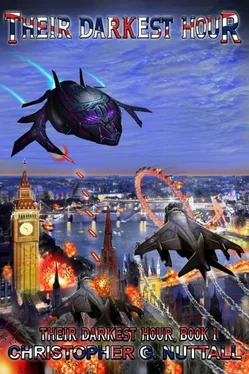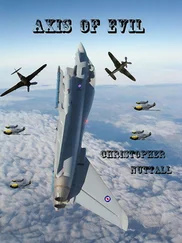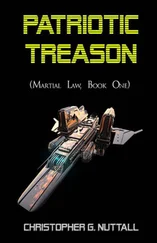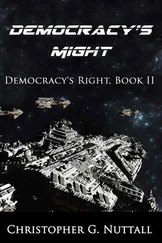Christopher Nuttall
THEIR DARKEST HOUR
“No one would have believed in the last years of the nineteenth century that this world was being watched keenly and closely by intelligences greater than man’s and yet as mortal as his own… across the gulf of space, minds that are to our minds as ours are to those of the beasts that perish, intellects vast and cool and unsympathetic, regarded this earth with envious eyes, and slowly and surely drew their plans against us.”
— H.G. Wells
The senior officers of the Conquest Force rose to their feet as the Command Triad entered the briefing room. Ju’tro Oheghizh bowed his head in submission as they took their three seats, each one representing and commanding an element of the fleet. Together, they would oversee the conquest — and pose no threat to the state, back home. They’d be too suspicious of one another to ever plot treachery together.
“We have been observing Earth for the past five of its rotations,” Va’tro Nak’tak said. Years , Oheghizh reminded himself, careful to think in the language of the prey. “The humans are a curious race. They may well be more unlike us than the Uteck.”
A rustle ran around the compartment as his words sank in. The Uteck, unlike most known races, didn’t possess two arms, two legs and one head. They were utterly alien — which hadn’t stopped them fighting the Eridiani to a standstill in fifty years of bloody warfare. The State still believed that they could defeat the Uteck and occupy their worlds, but it would be a long time before anyone saw fit to resume the war. It had simply been too costly.
“The humans have progressed remarkably unevenly,” Nak’tak reported. “Their space presence is pathetic; they have yet to establish a base on their moon or start mining asteroids for war materials. They are literally unable to pose any threat to the Conquest Fleet, even once we are in orbit around their world. Furthermore, their ruling power seems curiously unwilling to crush its enemies — they appear to be willing to accept the hatred of their inferiors, instead of forcing their inferiors to submit. This is without a precedent in all of known space.”
There was a pause. “However, in certain areas, they are actually more advanced than ourselves,” he continued. “Their most advanced computer systems are more capable than the devices we use on these starships — and certain other advancements may pose a threat to the Landing Force once we start taking up positions on the planetary surface. In particular, they have an alarmingly high number of nuclear weapons and — we must assume — a willingness to use them if they face defeat.”
Azhadib, the Director of Conquest, spoke into the silence. “Do you believe that this race will make acceptable clients for the State?”
“We believe that it may be harder than we expect to convince them to submit,” Nak’tak said. “Unlike our previous encounters with low-tech races” — all of which had been brought into the service of the State, their development short-circuited by their natural masters — “they offer the promise of a workforce that will not require extensive training to grasp the basics of our technology, assuming that they are capable of grasping it at all. We have a secondary reason not to simply exterminate this race. They will be very useful to us.”
He didn’t mention the first reason, Oheghizh noted, in the privacy of his own mind. Known space had many mysteries — races blossomed to life, built their empires, dominated the galactic scene for a few million years and then faded away — but even the State had heard rumours of the Elders. They’d been warned that genocide would be harshly punished. Oheghizh wasn’t sure if he believed the tales or not — the idea of someone being more powerful than the State was difficult to grasp — yet it seemed clear that someone believed them. There was no other explanation for the prohibition on genocide.
Earth spun in the centre of the compartment, a luminous orb glowing with blue-green light. It looked almost homelike, yet it was home to over seven billion humans. He glanced down at the reports the observers had filed in their long study of Earth, carefully monitoring the humans and devising plans for the invasion and conquest of their world. As one of the senior Land Force commanders, Oheghizh could expect high honours and rewards if he succeeded in bringing his portion of Earth under control — and endless infamy if he failed. The humans would pose a formidable problem, even to the State. But they would succeed. Failure would not be tolerated.
The assignments had been sorted out by the Command Triad and passed down as a unanimous decision. Oheghizh would be assigned to a medium-sized island nation, still one of the most advanced and developed states on Earth. Quite why they hadn’t developed any form of unity was a surprise — technological advancement tended to unite previously separated nations — but it hardly mattered. Their political divisions would work against them when the Conquest Fleet revealed its presence. They would have no time to plan a unified defence before they were overwhelmed.
And slowly, but surely, Oheghizh and his companions drew up their plans against Earth. The Human Race would never know what had hit them until it was far too late.
RAF Coningsby/Salisbury Plain/London
United Kingdom, Day 1
“It looks like a busy day for us, boys and girls.”
Flying Officer Alexandra Horton smiled as Squadron Leader Rupert Paddington opened the briefing. The men — and single woman — of No. 3 Squadron rarely had an uneventful day, even when they were patrolling the skies over Britain. After 9/11, every civilian aircraft that went off course sent ripples of alarm running through the United Kingdom Air Defence Region and it wasn’t uncommon for Tornados or Eurofighter Typhoons to be scrambled in response to an aircraft that had simply lost its way. Not that anyone was allowed to become complacent, of course. The Eurofighters were scrambled with live weapons and everyone knew that one day a hapless pilot would be faced with the choice of shooting down a civilian aircraft or watching it plunge into the Houses of Parliament. Alex was mildly surprised that none of the thousands of terrorist plots monitored by MI5 had ever come close to taking off.
“We’ve been informed that the UKGDE boys have been tracking more ghosts,” Paddington continued. “Someone higher up the food chain is getting just a little bit concerned with these reports and they’d like some hard data. You may be directed to perform an interception if a ghost shows up while you’re in the air.”
Alex frowned, thoughtfully. Over the last few weeks, radar sets in Britain — and America as well, she’d been given to understand — had been tracking a handful of transient contacts that seemed to be travelling right at the edge of Earth’s atmosphere. The general feeling was that someone — perhaps in Britain, but more likely in the United States — was testing a new model of stealth drone by flying it through one of the most advanced air defence environments in the world. It wasn’t an uncommon procedure, but surely someone would have said something by now, if only to prevent an interception that brought one of the craft down. Rumours she’d heard suggested that some of the top brass were more concerned than they admitted, at least to the pilots. There was a distant possibility that the Russians might have produced something new that they were using to probe NATO’s defence environment.
She shook her head, reaching up to feel her short blonde hair. Her fellow pilots had nicknamed her Starbuck back when she’d started training to fly the Eurofighter and the name had stuck. Being assigned to No. 3 Squadron was hardly a blot on her record, even if defence cutbacks did make their position increasingly insecure. She’d heard that some of the top brass were worried about their ability to defend the UKADR if more squadrons were placed in reserve, or eliminated altogether. Buying the Eurofighter might have seemed like a good idea back before 9/11, but now the money was flowing to the army and aircraft that could provide support to British troops on the ground. The Eurofighter was an excellent piece of kit, yet it didn’t have the close-support capability of an Apache helicopter. Their service in Afghanistan had always been far less decisive than the MOD had hoped.
Читать дальше












